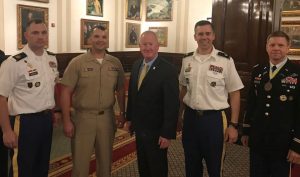 Why Dixon Center?
Why Dixon Center?
I joined Dixon Center in June 2015 because of a shared belief with Colonel David Sutherland that the answer to veteran and military family struggles are really in the communities. Community-based solutions are the way this nation can address the shortfalls and gaps that often occur after government and state organizations do their bit. Philosophically, I was in line with what Dixon Center was doing.
I went through my own trial and error post-transition. I did what most aviation folks do – I joined some defense contractors to help in business development. That wasn’t really my cup of tea. You don’t just turn off the switch to serve just because you hang up the uniform. So, through my long association with Dave we found a way I could work with him and combine our efforts. We wanted to continue the journey of service that we’re all engaged in, one way or another. It gives us a reason to get up in the morning. Every day is different. Because the needs of our military veterans are evolving, the solutions we had yesterday don’t necessarily stand up today. We must be very agile and innovative. That was appealing.
Do you think your military service has helped you in responding to those needs and changes in this landscape?
Of course it has – being a United States Marine and a leader of Marines for over 25 years. One of the unique things about the Marine Corps is that we have to interact on a grand level with the other services in order to be successful. I think that’s how I learned early on that partnerships matter, leadership matters, and being able to leverage each other’s strengths and help to avert each other’s weaknesses all works for the other’s betterment. It’s those same ideas that work for the betterment of veterans and their families.
What does your role entail?
As the President of the organization, I am responsible for everything that’s done and that isn’t done to further the execution of our mission. My focus is on not only Dixon Center activities, but how we interact with our parent organization, Fedcap and all its subsidiaries.
I am focused on our neighborhood, so to speak. I’m focused on making sure we’re doing the things that we see as necessary throughout the country, but also enabling our partners and The Fedcap Group to expand or improve their service for veterans and military families.
What is the biggest challenge today?
People don’t know who we are. Not Dixon Center, but veterans and military families. When I spoke at an event recently in Texas, I mentioned how everyone uses the phrase “Thank you for your service,” when what they really need to do is dig a little deeper, peel another layer of the onion off. I had this one veteran come up to me after saying that and he said how true it rang for him. He had been sitting in the back, isolating himself from the crowd, and he told me he had been suicidal. Somebody had gone over to him, noticing he was sitting alone and isolated, and took that step to have a conversation, to try to understand what this service member, this veteran was going through. He told me flat out, “if someone had not done that, taken that extra step, asked me what I did over there,” he was convinced he wouldn’t have made it. That’s a message that can’t be shared too many times.
Our population is more and more disconnected with military service every day. Anything you can do to assimilate veterans back into our communities by shared knowledge or at least acknowledging what they’ve been through and what they’re going through might just be enough to pull somebody out of a dark place.
Do you have a proudest moment with Dixon Center?
There’s been a lot of them, but I don’t really like to single out proudest moments because they are just that, points in time. I am most proud of our flexibility and our agility.
And perhaps this – the key ingredient that really makes it possible to do what we do is our opportunity to interact with veterans every day. If I had to choose a proudest moment, I’d say that. As a center with national reach and thousands of partners and individuals across the country that support and help us, it’s easy to focus on work of organizations. But at our foundation we still get on the phone every day with veterans from every demographic and in every type of circumstance we could imagine. We’re ingrained with individuals all over the country and it gives us a unique ability to really understand what’s going on outside the Beltway, outside major metropolitan areas. It allows us to look in on those communities that have good services, but also find those that maybe don’t have resources or are underserved by veteran services organizations and government services.